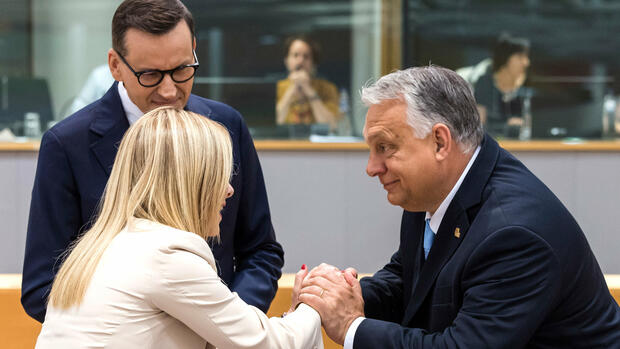In the asylum dispute, the interior ministers made a majority decision at the beginning of June that Poland and Hungary did not support.
(Photo: dpa)
Brussels The EU states are again arguing about the future asylum policy. At the EU summit, Poland and Hungary are calling for a move away from the difficult compromise that the interior ministers reached just under three weeks ago.
But Germany and other countries held back on the first day of the summit. The 27 heads of state and government parted early Friday morning without the planned joint declaration on migration.
On the first day, no agreement was reached, said Belgium’s Prime Minister Alexander De Croo. “But the good thing is that everyone said we’ll try again tomorrow.” Talks continue on Friday morning. The second day of the summit is supposed to be about the EU’s China policy.
In the asylum dispute, the interior ministers made a majority decision at the beginning of June. In particular, a much tougher treatment of people from countries that are considered relatively safe is planned. In the future, after crossing the border, they will be taken to strictly controlled reception facilities under conditions similar to detention. There, it would normally be checked within twelve weeks whether the applicant has a chance of asylum. If not, it should be sent back immediately.
The agreement, which Poland and Hungary no longer support, also stipulates that the acceptance of refugees should no longer be voluntary in the future, but mandatory. Countries that do not want to take in refugees would be forced to pay compensation.
>> Read about this: The European asylum system is being radically tightened
Poland is now demanding that each EU country should decide for itself how to support countries with particularly high migration numbers. The admission of those seeking protection should be voluntary, according to a Polish text proposal for the summit declaration, which was available to the German Press Agency.
The Polish government also took the position that migration policy should be decided according to the consensus principle, i.e. not by majority decision. Hungary also announced before the summit that it would not participate in the planned distribution of refugees in the EU and would not make any compensation payments.
At the beginning of the summit, Chancellor Olaf Scholz appeared unimpressed by the Polish and Hungarian criticism. The solidarity mechanism agreed by the interior ministers is a major breakthrough, said the SPD politician.
If the 27 heads of state and government do not agree, it would be a scandal. In practice, however, the legislative process could continue. The next step is negotiations between the EU states and the European Parliament.
EU wants to support Ukraine more
On the first day of the summit, the heads of state and government agreed on supporting Ukraine. They want to give Ukraine more support in planning an international peace summit, which could be organized in Switzerland according to the ideas of Ukrainian President Volodymyr Zelenskiy. And the EU is offering further assistance to Ukraine after the destruction of the Kakhovka dam, on top of the civil protection assistance already provided.
The EU wants to give Ukraine more support in planning an international peace summit.
(Photo: AP)
However, the EU is reluctant to provide security guarantees for the period after the end of the Russian war of aggression. In the summit declaration, the heads of state and government only agreed on a vague declaration of intent for “future security commitments”. The reason for the cautious choice of words was the attitude of countries such as Austria, Ireland and Malta. They want to remain militarily neutral and are therefore not a member of NATO.
China policy is supposed to be the central topic on Friday. In view of the development of the world’s second largest economy, which is viewed with concern, the EU wants to reduce economic risks and dependencies. In the prepared text for an explanation on the subject, however, it is also emphasized that one is not striving for decoupling.
“Despite their different political and economic systems, the European Union and China have a common interest in constructive and stable relations,” it said. The European Union will continue to work with China to address global challenges. Climate change is cited as an example.
China should also be urged to urge Russia to end the war of aggression against Ukraine and immediately and unconditionally withdraw all troops from Ukraine.
More:
